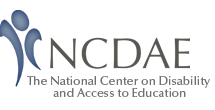NCDAE Webcast
NIMAS in IDEA, What You Need To Know Now
Thank you to the over 130 people who tuned into the the February 28th webcast on NIMAS in IDEA. The archived broadcasts and the transcript are available below.
Overview
The National Instructional Materials Accessibility Standard (NIMAS) is an important new piece of the reauthorized IDEA. It will guide the ways in which textbooks and core instructional materials are delivered so they may be converted easily into accessible formats. Although the final federal regulations have yet to be released, directors of special education will need to know enough about NIMAS to understand how to fill out the federal forms for the coming year. Each state will be asked to provide assurances about NIMAS (e.g., checking the box) and to opt in or out of the national repository, the National Instructional Materials Access Center (NIMAC). NCDAE is pleased to offer a Webcast on this important new piece of IDEA and hope it will assist states in their preparation for this upcoming fiscal year.
Panelists
Chuck Hitchcock
As CAST's Chief Officer, Policy and Technology, Chuck Hitchcock oversees CAST's public policy initiatives and technology innovation. He was recognized as an information technology innovator by the 1999 Computerworld Smithsonian Awards for the development of Bobby, CAST's free public service for Web site accessibility. Mr. Hitchcock is also Director of a U.S. Department of Education Office of Special Education Programs (OSEP) cooperative agreement project, the new "NIMAS Technical Assistance Center" and directs CAST's work on the American Institutes for Research Technical Assistance project, the Center for Implementing Technology in Education" (CITEd).
Mr. Hitchcock has extensive practical experience in special education administration, technology education, and teaching at all levels from early childhood to graduate school. He co-directed a private learning disabilities clinic, served as the founding director of a Massachusetts statewide technology training and support center that served 180 school districts, and was an account executive for hardware and educational software companies.
Jessica Brodey
Jessica M. Brodey is an attorney and a public policy advocate with more than 10 years of experience. Ms. Brodey's practice focuses on education, assistive technology, disability, Internet, communications and technology policy. Ms. Brodey has significant experience in Congressional lobbying, coalition building and organizational outreach, such as her work with the Technology, Education, and Accessible Media (TEAM) Coalition, a coalition of disability rights groups, educational organizations, and technology companies working to increase students' with disabilities access to educational technology. Most recently, Ms. Brodey has served as the Policy Counsel for the Assistive Technology Industry Association (ATIA) and provides policy analysis and strategic advice regarding the National Instructional Materials Accessibility Standard (NIMAS) to the NIMAS Development and Technical Assistance Centers at CAST.
As the founder of Deaf Legal Connection, Ms. Brodey also represents deaf clients in civil matters before the District of Columbia Superior Court, and works to promote policies that improve deaf individuals' access to the courts. Previously, Ms. Brodey worked at Arent Fox Kintner Plotkin & Kahn, PLLC, where her practice consisted primarily of intellectual property, Internet and e-commerce counseling and litigation, and at the President's Committee on Employment of People with Disabilities. Ms. Brodey also worked for many years as a free-lance American Sign Language Interpreter.
Ms. Brodey received her JD from the New York University School of Law. She received her BA from Emory University in Atlanta, Georgia, where she graduated summa cum laude and Phi Beta Kappa.
Catherine Benitz
Catherine Benitz is a Program Specialist with the Mountain Plains Regional Resource Center. The MPRRC is a technical assistance center funded by the office of Special Education Programs to provide special education support and resources for 10 States and the Bureau of Indian Affairs (BIA). Catherine's areas of expertise are in early childhood, Part C services, technical assistance evaluation, inclusion, and low incidence populations. Prior to working with the MPRRC, Catherine has been the Assistant Director and Training Coordinator for the Region VIII Head Start Disabilities Quality Improvement Center housed at Utah State University. Following her M.Ed. degree from the University of Washington in Early Childhood Special education, she served as the director of a non-profit early childhood, early intervention, and Head Start program in Wyoming. Other activities have included serving on the state Interagency Coordinating Council, the Wyoming Parent Information Center Board, and many other non-profit and educational task groups.
Moderator
The discussion is moderated by Cyndi Rowland of the National Center on Disability and Access to Education.

